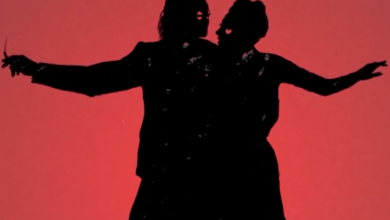Sapphic Cinema: Bend it Like Beckham Turns 20

Bend it Like Beckham is the greatest lesbian film that never was. On the surface it’s a sweet coming-of-age story about two best friends from different backgrounds. Jess (Parminder Nagra) and Jules (Keira Knightley) are united by their shared love of football – what you Americans call soccer – and a dream of playing professionally. But there’s so much more to it than that. The film came out in 2002, at a time when queerbaiting was the best representation lesbians could realistically hope to find in mainstream cinema.
I was nine years old when Bend it Like Beckham was released; still over a decade away from making sense of my sexuality and coming out as lesbian. But that film made a huge impression on me. The way Jules stared at Jess playing football in the park. How they bonded over laughter and shared secrets. That easy, playful intimacy between them. It all meant something – though I didn’t yet know what.
Every time Jess’s family mentioned the possibility of her finding a boyfriend, she was horrified. And when, forty minutes in, Jess is seen laughing with Jules at a bus stop and accused of kissing a secret boyfriend, her reaction is telling. “Kissing? Me? A boy? You’re mad. You’re all bloody mad!”

Rewatching the film as an adult, it’s obvious what my younger self read into it. As Jules herself points out, wearing tracksuits doesn’t make you a lesbian. But the tracksuits, sports bras, and bandana she wore throughout the film did make up a specific, butch-of-centre lesbian uniform in the early 00s.
And it’s not just about the clothes. Jess and Jules had real chemistry. In fact their handholding, hugs, and kisses contained far more chemistry than either girl had with Joe – the ostensible male love interest. Jess and Jules should have been together.
Rumors have long circulated that was originally supposed to have a romance between Jess and Jules. But Knightley denied ever having seen that version of the script. She did, however, express keen enthusiasm for Jess and Jules as a couple: “That would’ve been amazing,” said Knightley in a 2018 interview. “I think they should’ve been [lesbians] too. I think that would’ve been great. We need a sequel!”
The struggle Jess and Jules have to make their families accept their passion for football – a traditionally masculine sport – shares many parallels with coming out as lesbian. Jess’s parents and Jules’s mother both disapprove, to begin with. Their behavior is seen as unusual, and they must fight to be understood. It wouldn’t be a stretch to make what is coded in the original explicit in a sequel.
But – whether we get a sequel or not – the original has found a home in the hearts of lesbians around the world. Two decades on, it remains a compelling work of cinema. On top of the sapphic subtext, it explores some (unfortunately) evergreen themes.
Bend it Like Beckham deals with the struggle to have women’s sport taken seriously. It shows racism in football. It highlights colorism (“look how dark you’ve become, playing in the sun!”). It demonstrates the problems of treating boys, marriage, motherhood, and domesticity as an inevitable part of girls’ lives. In many ways, this movie feels as relevant now as it did at the time of release.
But there are some problems with the film. And I don’t just mean the hideous Y2K fashion. While being mistaken for a boy is something many lesbians are familiar with, the idea of Keira Knightly being read as male is laughable.
And there’s one scene that definitely wouldn’t wash with today’s audiences. When Jess tells her (white) coach that a player on the opposing team called her a racial slur, he says “I’m Irish. Of course I understand what that feels like.” Sure, there are similarities between how Britain colonized India and Ireland. But Joe will never know what it is like to be seen as less than human because of the color of his skin. And that response was weak.
Still, in spite of these faults, it’s hard to imagine a film like Bend it Like Beckham being made today. This movie celebrates women’s athleticism. It shows women getting sweaty, women in changing rooms, without ever catering to the male gaze. By that I mean every woman is shown to be an athlete, never reduced to a sex object through the camera’s lens. For most of the film, Jess and Jules wear androgynous, loose-fitting clothes and virtually no makeup. When they’re training or playing a match, these characters sweat.

None of these things should be exceptional. But – for all the strides we have made towards positive representation – femininity only ever seems to tighten its hold in how women are depicted in Hollywood. When you look at the polished, primped teen girls played by twentysomethings in Euphoria or Riverdale, it becomes clear that not all changes in how young women are shown on screen count as progress.
Bend it Like Beckham did something extraordinary in how it championed women’s football. It showed the complexities of young women’s lives, and offered a moving depiction of South Asian community in Britain. Whether you read it as friendship or something more, the relationship between Jess and Jules is magic.
Bend it Like Beckham is now streaming on Prime Video





